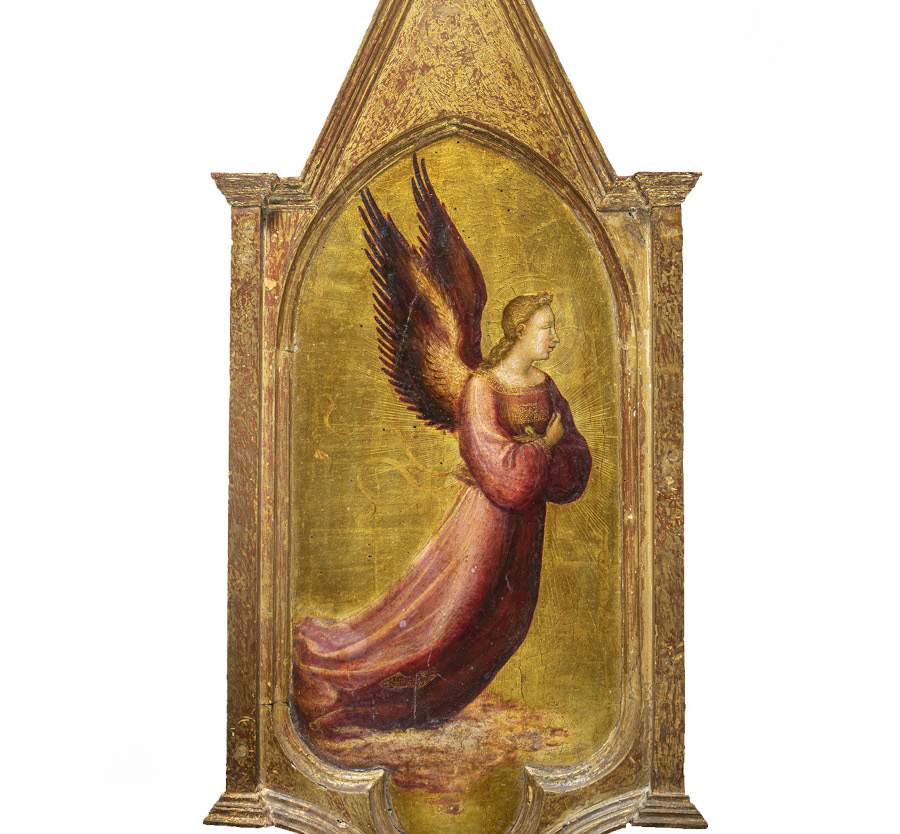The Accademia Gallery in Florence has been enriched with new works: two extremely valuable pinnacles depicting the AnnouncingAngel and the Virgin Annunciate by Giovanni di Francesco Toscani. These go to recompose part of the 15th-century polyptych that was on the altar of the Ardinghelli Chapel in the Basilica of Santa Trinita in Florence. The paintings, which will undergo careful restoration, were purchased from the heirs of Nicolò Carandini and Elena Carandini Albertini at a total cost of 400,000 euros.-
“It is the task of a museum to complete and expand its collections, to search for dismembered and dispersed artistic heritage, including through the antiques market,” argues Cecilie Hollberg, director of the Accademia Gallery in Florence. “There are rare occasions, like this one, where, thanks to private individuals, we were able to track down and acquire the two side pinnacles of this important polyptych. In our collections we already have the central pinnacle with the Crucifixion-it has been part of it since 1855-and one of the predella compartments depicting the Stigmata of St. Francis and a miracle of St. Nicholas of Bari, which arrived in our museum in 1933. We know that the central compartment, with the Adoration of the Magi, is kept in an Italian private collection. I take this opportunity, therefore, to appeal to the owners so that it can be reunited with the other panels in the Gallery.”
Giovanni di Francesco Toscani (1371/1372 - 1430), a Florentine painter, also painted, together with his brother Domenico, the frescoes with the stories of St. Nicholas that decorated the patronage chapel of the Ardinghelli family in the Church of Santa Trinita. The polyptych is his only documented panel painting. It was commissioned in 1423 for the marriage of Piero di Neri Ardinghelli to Caterina, niece of Palla Strozzi, who already owned a magnificent chapel in the same Basilica, designed by Lorenzo Ghiberti. Strozzi had given Caterina a dowry of about 2,000 florins, part of which was used to renovate the Ardinghelli chapel. In the center of the altarpiece made by Toscani, instead of the traditional Madonna and Child, a wooden crucifix was placed as a reliquary and, at certain times of the year, was displayed for public devotion through a grille on Via del Parione.
The polyptych was dismembered in the second half of the 18th century, and the various panels reappeared, in different years and places, only from the mid-19th century. In 1966, thanks to Luciano Bellosi, it was possible to identify Giovanni di Francesco Toscani as the author of the work, as well as to clarify what its original structure was. Of the paintings that composed this beautiful masterpiece, in addition to the four panels now in the Galleria dell’Accademia in Florence, the right-hand compartment of the predella with The Baptism of Christ and The Martyrdom of St. James the Greater is in the Philadelphia Museum of Art, while the main right side panel with Saints John the Baptist and James the Greater is in the Walters Art Museum in Baltimore. The main left side panel, in which Saints Francis and Nicholas were depicted, and the three roundels, below the three pinnacles, are still missing.
 |
| Florence, Accademia Gallery acquires new works, part of Ardinghelli Polyptych in Santa Trinita |
Warning: the translation into English of the original Italian article was created using automatic tools. We undertake to review all articles, but we do not guarantee the total absence of inaccuracies in the translation due to the program. You can find the original by clicking on the ITA button. If you find any mistake,please contact us.